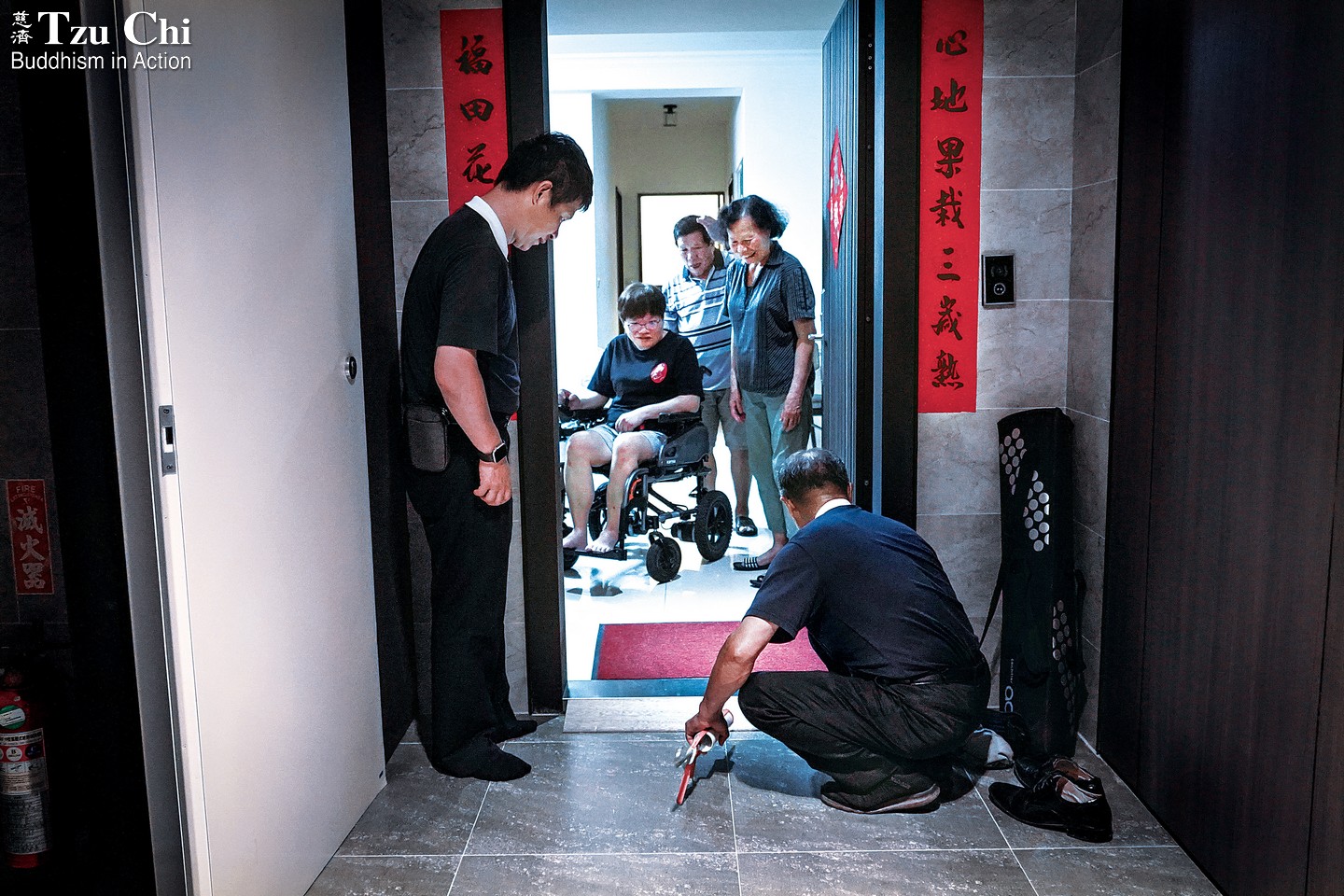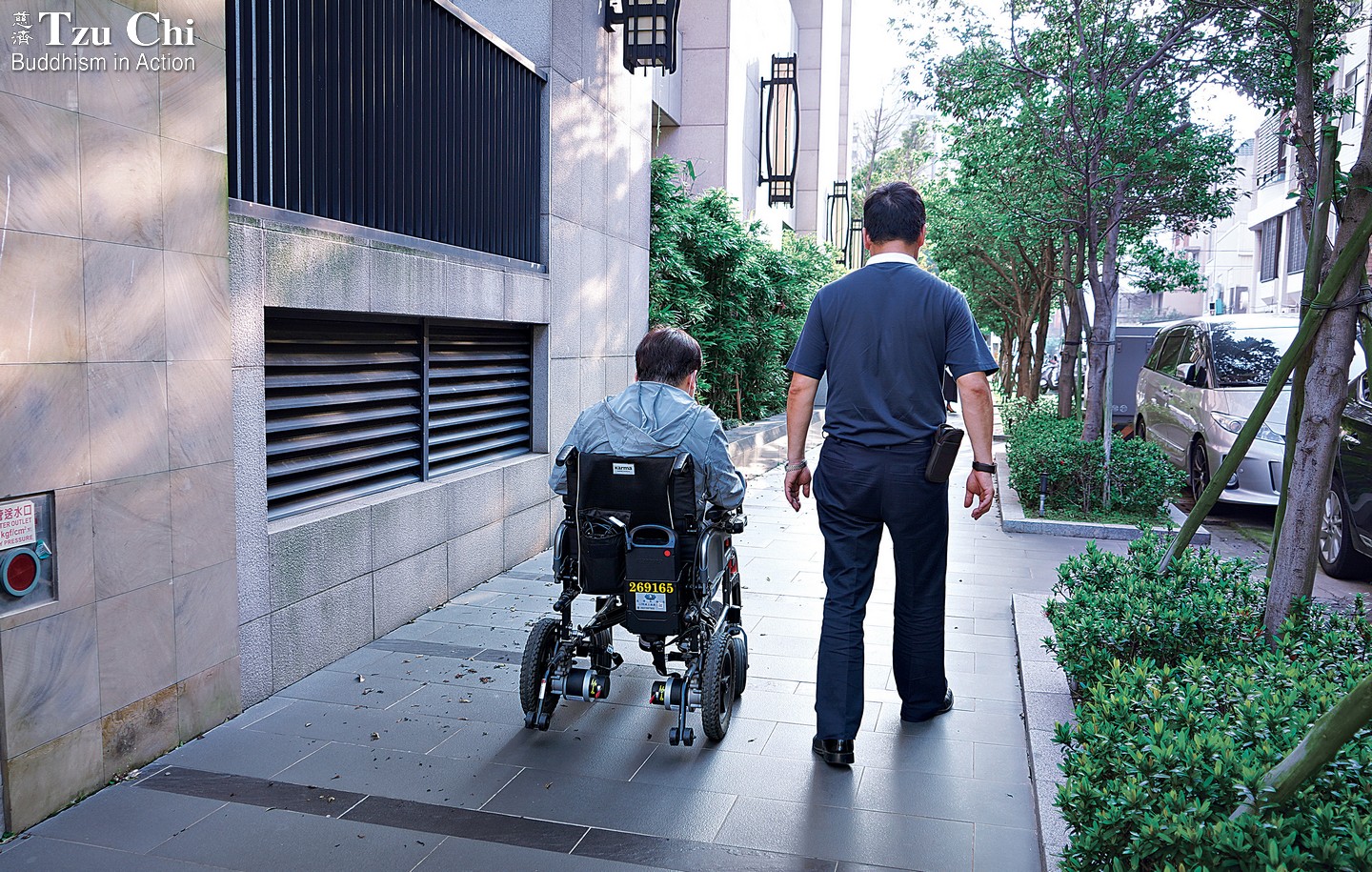By Ye Jin-hong, Yang Qiu-yan, and Zhu Xiu-lian
Edited and translated by Wu Hsiao-ting
Photos by Ye Jin-hong
A mother’s offhand comment led to a series of generous acts, providing more support than expected for her daughter’s rehabilitation and a fellow patient’s needs.

Yang Wen-zong (right) installs the completed threshold ramp at the entrance to Lin Jun-yi’s home, making it safer for her wheelchair to navigate the height difference at the door.
It’s really hot, and pushing you is exhausting,” Li Feng-chun (李鳳春) mumbled absentmindedly as she pushed her daughter Lin Jun-yi’s (林君憶) wheelchair down the street under the scorching sun. Though Feng-chun didn’t give it much thought when she said it, her daughter took it to heart. Jun-yi couldn’t bear the thought of her 70-year-old mother exhausting herself every day, pushing her to her rehabilitation sessions. But after brain surgery had severely impaired her mobility, she knew that consistent rehabilitation was her only hope of regaining her functions.
Determined to lighten her mother’s load, Jun-yi searched online for a wheelchair that could make things easier, though she struggled to articulate exactly what she was looking for. Fortunately, she persisted. She eventually connected with Tzu Chi’s Eco-Friendly Assistive Device Program, which provides free, second-hand assistive devices to those in need. Fang Qi-hui (方奇輝), a volunteer with the program, patiently listened to Jun-yi over the phone. He found it difficult to fully understand her situation, so he decided to visit her in person. Jun-yi lives in Zhunan Township, Miaoli County, northern Taiwan. After meeting face-to-face, he delivered an electric wheelchair to her and taught her how to operate it. After some practice on the neighborhood sidewalks, she quickly got the hang of it.
The daily commute to rehabilitation took half an hour, followed by an hour of therapy. Pushing a manual wheelchair back and forth had been tough on her mother, especially during the hotter parts of the day. With the electric wheelchair from Tzu Chi, however, Feng-chun could now simply walk alongside her daughter to and from rehab. Volunteer Fang was confident that the new wheelchair would make the journeys much easier, thereby relieving some of Jun-yi’s guilt. Even better, Jun-yi happily noted, “Now I can go wherever I want by myself.”
Feng-chun felt a deep sense of relief as the rehabilitation sessions began producing results. She was happy to see her daughter’s improvements, such as being able to get up and go to the bathroom on her own at night. But her greatest hope remained that Jun-yi would be able to walk again.
Just when it seemed that everything was finally falling into place, Fang noticed that the threshold at Jun-yi’s home posed a challenge for the wheelchair. The uneven surface could cause the wheelchair to tip over, especially before Jun-yi became fully proficient in using it. Coincidentally, the volunteer who accompanied Fang, Yang Wen-zong (楊文宗), was a carpenter. After discussing the issue with Fang, he decided to make a small threshold ramp. They measured the dimensions on-site, returned to their local assistive device warehouse, found a solid wood board, planed it, and then installed it in front of the door. It fit perfectly. When Jun-yi tested it, it worked beautifully.
Jun-yi expressed her profound gratitude for the volunteers’ help—not only had they provided her with a powered wheelchair and adjusted its speed for her safety, but they also took the time to build the threshold ramp. She went on to share that during her rehabilitation, she had met many fellow patients in need of assistive devices and had informed them about Tzu Chi’s program, hoping they too could receive help at no cost. “You are truly kind, offering a service like this. This can help so many people,” she told the volunteers.
During a visit to Jun-yi, Fang happened to meet Ms. Ko, one of Jun-yi’s fellow patients. Ms. Ko was holding a cloth sheet she had bought online, thinking it was a bedsheet when she placed her order. However, when she received it, she realized it was just a piece of cloth. “This can’t be fixed on my bed and can’t be returned,” she said. “I’ve asked several clothing alteration shops for help, but none of them were willing to take my order.” Fang thought of his 85-year-old mother, Fang Zheng Feng-yu (方鄭鳳玉), who was skilled in sewing. With Ms. Ko’s permission, he took the cloth home and asked his mother if she could sew on some elastic and turn it into a bedsheet.
Though Fang’s mother had never sewn a bedsheet before, she relied on her tailoring skills to figure it out, and expertly completed the task. Upon receiving the finished product, Ms. Ko asked Jun-yi to pass along her gratitude, saying, “A big thank-you to the Tzu Chi brother’s mother!”
Through his volunteer work, Fang has realized the power of collective effort. “When people are in need, I believe everyone is willing to lend a hand,” he said.
Fang Qi-hui (right) accompanies Lin Jun-yi as she practices operating the electric wheelchair.




